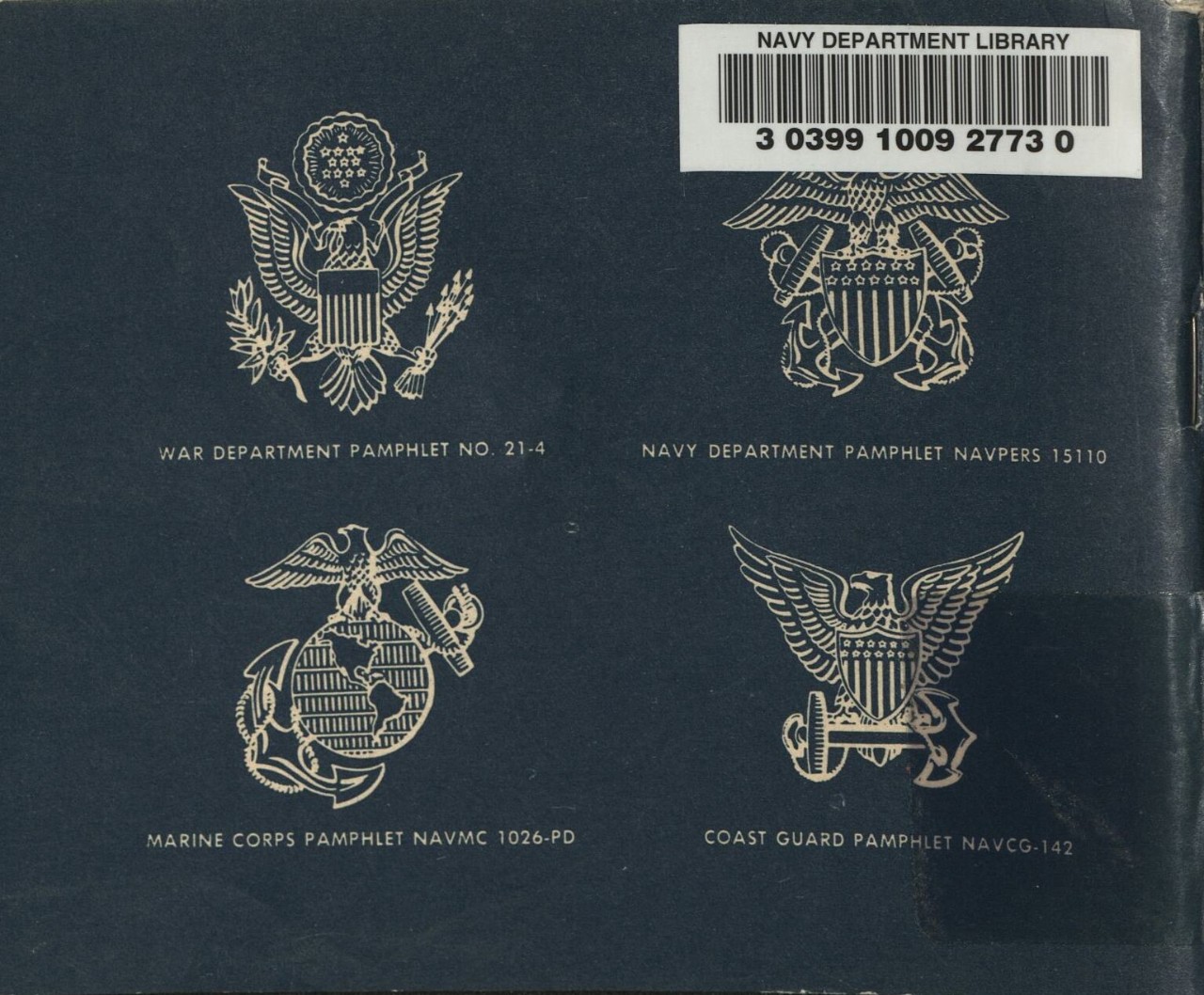
The Navy Department Library
Going back to civilian life - a pamphlet
August 1945
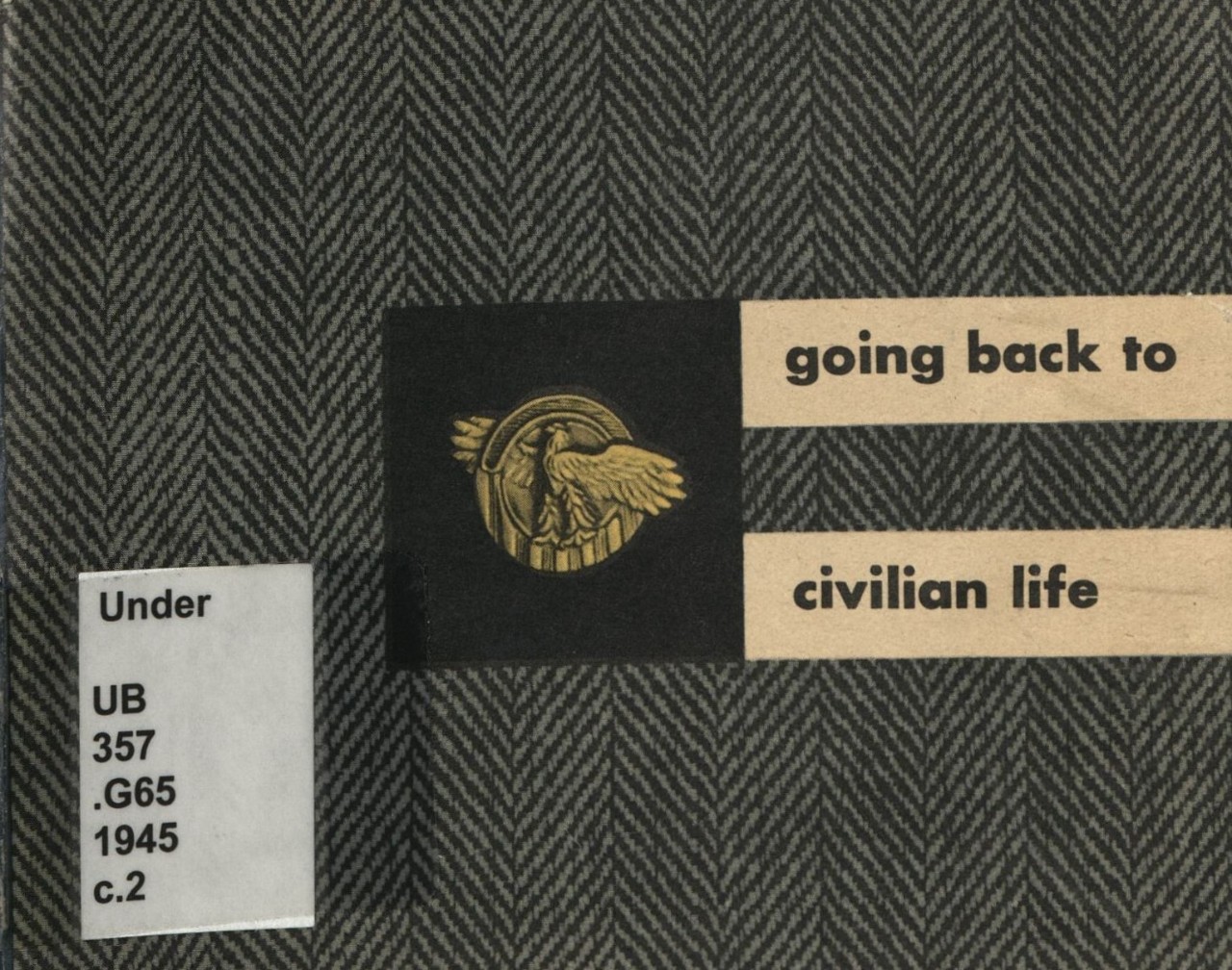
Upload PDF Version [20.8MB]
War and Navy Departments
Washington 25, D.C., 20 August 1945
War Department Pamphlet No. 21-4, Navy Department Pamphlet NAVPERS-15110, Marine Corps Pamphlet NAVMC 1026- PD, and Coast Guard Pamphlet NAVCG-142, “Going Back to Civilian Life,” has been prepared jointly by the War and Navy Department and is published for the information and guidance of all concerned.
[AG 461 (3 August 45)]
G.C. Marshall E.J. King
Chief of Staff, Commander-in-Chief
U.S. Army U.S. Fleet, and Chief of Naval Operations,
U.S. Navy
Official: Official:
Edward F. Witsell Randall Jacobs
Major General Vice Admiral
Acting the Adjutant General Chief of Naval Personnel
Contents
| The Nation Salutes You | IV |
| How to Use This Booklet | 1 |
| Going Home | 2 |
| Keep Them Protected | 22 |
| What About a Job | 31 |
| Your “G.I. Bill of Rights” | 38 |
| Additional Facts for Your Future | 52 |
| What the Disabled Veteran Should Know | 60 |
| Benefits for Dependents | 70 |
| For Further Details *** Apply to | 76 |
| Personal Record | 78 |
| Letter Referred to on pages and 30 (National Service Life Insurance) | 84 |
| In an Emergency | 85 |
The Nations Salutes You
Our country was founded by men and women, like you, who were willing to fight for its freedom. It has remained free because, when the need arose, new generations were willing to fight and, if necessary, to die for what they loved.
By your service in this war you have your share to safeguard liberty for yourself, your family, and the Nation. You have helped to preserve that liberty for generations to come.
This booklet is for guidance. It gives several sources information and assistance for you. Numerous privileges are mentioned. They are yours. You have earned them, just as you have earned the respect and gratitude of your fellow citizens.
IV
When you return to the duties and responsibilities of civilian life, you take with you the good wishes of those who were in the service with you. You can always be proud that you were once a member of America’s armed forces.
| G.C. Marshall | E.J. King |
| Chief of Staff | Commander-in-Chief, |
| U.S. Army | U.S. Fleet, and Chief of Naval Operations, U.S. Navy |
| A.A Vandegrift | R.R. Waesche |
| Commandant, | Commandant, |
| U.S. Marine Corps | U.S. Coast Guard |
How to Use This Booklet
This booklet has been written for YOU. Its purpose is to help you to get yourself establish again. As a civilian. It won’t answer ALL the questions that might arise because there are too many laws and regulations affecting veterans to include in a small booklet. Instead, it gives you the more important facts and tells you where to go for additional information.
It will be to your advantage to read this booklet through carefully now- then keep it in a handy place for future reference. If you don’t happen to be in the mood for reading, your first impulse may be to throw it away. Don’t make that mistake! Put it away in a safe place for the day when you’re looking for the answer to a particularly tough problem. It will pay you dividends.
There are pages at the back of the book on which you can keep a convenient personal record of important numbers, dates, and addresses.
1
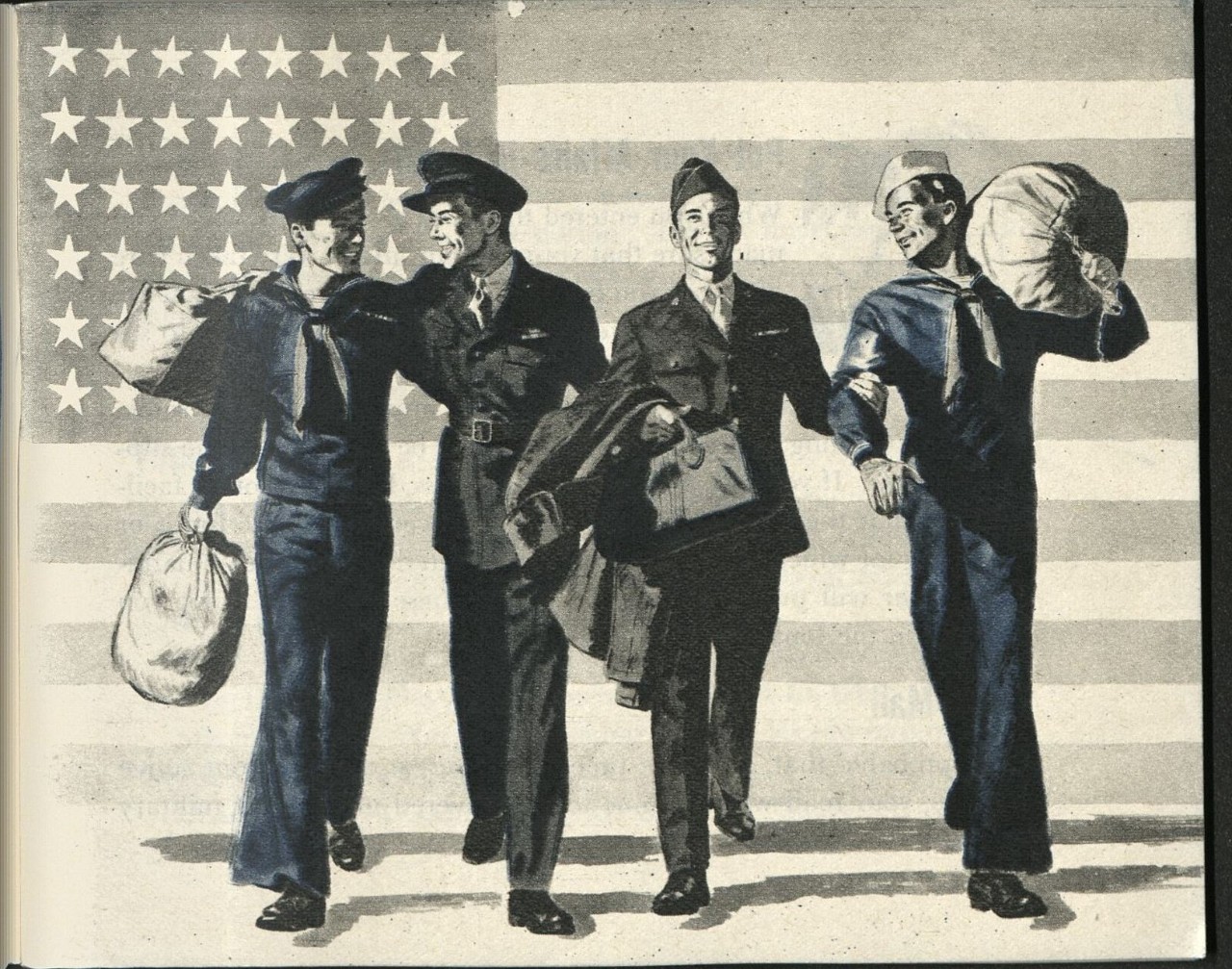

Put Your Affairs in Order
When you entered the service, you were wise if you made sure that your civilian affairs were taken care of before you put on a uniform. Now that you are about to leave the service, it is equally wise to see that your military affairs are in order.
These are usually matters of routine but important just the same. Turn in clothing and equipment that must be returned to the supply officer. If you owe money at a club, mess, library, or other facility, see that these bills settled. Turn over any public funds or property for which you are responsible. If in doubt, your commanding officer will put you straight. Doing these things will save you trouble in the long run.
Your Mail
It is probable that, for some time after your separation from active service, your mail will continue to be delivered to your last military or naval address. To make sure it is sent on to you as quickly as possible, file the address where you want your mail forwarded with the postal officer at your last station. Do not have your mail sent to you at a Separation Center or Reception Station. You won’t be there long enough to get it.
You will not be entitled to use the free mailing privilege after your separation from active duty.
Your Bonds
If you have any questions about bonds which you purchased by allotment, write to the service in which you served as follows:
Army- Army Central Adjustment Office, 366 West Adams Street, Chicago 6, Illinois.
Navy-Field Branch, Bureau of Supplies and Accounts, (Bond Issuing Division), Navy Department, Cleveland 15, Ohio.
Marine Corps- War Bond Issuing Officer, Headquarters, U.S. Marine Corps, Washington 25, D.C.
Coast Guard- Commandant, U.S. Coast Guard, Washington 25, D.C.
5
In your letter put all information you have about the numbers and value of the bonds in question, the date and where you brought them, the service in which you served, organization and station or ship at the time of purchase, and your name and serial, service or file number.
A Helpful Record
During your final processing from the service, you will be interviewed and given a record (Army W.D., A G.O., Form 100, Separation Qualification Record; Navy and Coast Guard Description of Rating Booklet and Form Nav Pers 553 or Nav CG 553; or Marine Corps Form NAVMC 78-PD) prepared for you. This is a record of your civilian and military training and work experience and shows those civilian jobs to which you’re training and experience is most related. It is for your use in getting a job, or applying for training. In addition, information about jobs, training, and opportunity is available through individual interviews. You will be told what agencies in your community can be of service to you along these lines.
Your Certificate and Military Record
When you are discharged, you will receive a Discharge Certificate and the record mentioned above. Ordinarily, if you are only being returned to inactive duty, you will receive a certificate of service and /or release papers and will not receive a Discharge Certificate at this time. Whichever one you get will be very important to you. Be sure to keep it and know where to find it at all times.
Record Your Certificate
Since your Discharge Certificate (or certificate of service) is a valuable document, you will be wise to have it recorded. This means having an exact copy made in the official record books of the country in which you live. To do this, take your Discharge Certificate to the country clerk, county recorder, or other appropriate official at your local county courthouse. Most States will record your certificate. The majority of these States will do so without charge. Usually, the original certificate will be returned to you. Keep it in a safe place.
7
If you ever need a copy you can get a certified one from the recording official. In case you lose the original, you can replace it with a different certificate by applying to the service in which you served.
Your Serial, Service, or File Number
When you entered the service, you were given a number for identification purposes. That number, depending upon your branch of the service, is designated as a serial, service, or file number. Maybe you think you will never forget it. Don’t take any chances. Keep a record of it where it won’t be lost. You may need it on many future occasions. Some of the records concerning you are filed under that number, and if you forgot it, you may be caused much unnecessary delay and “red tape.”
Personal Problems
An officer will be found at most posts, camps, and stories or other service installations in the continental United States who is there to help you and your dependents after your separation from active military service. He’ll give you all the information he can concerning your personal problems and the rights benefits, or privileges to which you or your dependents may be entitled. This officer will also furnish you with information about the agency or organization which takes care of the particular benefit in which you or your dependents may be interested. In the Army, these officers are known as Personal Affairs Officers; in the Navy and Coast Guard, as Civil Readjustment Officers; and in the Marine Corps, as Rehabilitation Officers.
Veterans’ Information Center
In most communities there is a Veteran’s Information Center which will get you to the agencies which can help you with problems. In addition, all local draft boards, United States Employment Service officers, and Veterans’ Administration offices are Veterans’ Information Centers.
9
Red Cross
After separation from the service, the nearest chapter of the Red Cross will assist you or your dependents on any personal or family problem or will put you in touch with the agency to handle your problem.
Legal Problems (Legal Assistance)
If you need legal advice or assistance about any personal legal problem, see the Legal Assistance Officer at your station before you leave the service. This officer will be glad to help you and will tell you what to do about the problem after you are separated from the service.
If you need legal advice after you leave the service, consult your own lawyer, if you have one. If not, see the Bar Association or Legal Aid Society in your locality. These can usually be located by inquiry at the local courthouse or through the agencies listed in page 76.
You should have legal advice about following: Your Will may not be valid in the State where you take up residence. The witness may not be available, or changes in your family such as death, marriage, divorce, or birth of children may require a new will.
Your Power of Attorney made while you were in the service should be canceled if no longer needed.
Other Matters may call for legal advice, such as your taxes or protection that may be available for a limited time under the Soldiers and Sailors Civil Relief Act, as a law suit, judgements, contacts, repossession of property, tax sales, evictions, rights in public lands, etc.
Your Taxes
In some cases, Federal and State laws provide for deferment or adjustment of tax payments owned by veterans. For information on Federal income tax and other Federal taxes, go or write to the office of the Collector of Internal Revenue nearest your home. Your own State Tax Commission at the State capital or State revenue office nearest your home will answer questions about State income and other States taxes. Property and school taxes are the concern of your county, city, or township. You may avoid trouble and save money by looking after any delinquent tax matters as soon as possible after you leave the service.

Maternity and Child Care
If your wife was expecting a child at any time while you were in one of the lower four enlisted pay grades (or while you were an Army aviation cadet). Your wife may file an application with your State Department of Health for maternity care under the Emergency Maternity and Infant Care Program. Medical care for the first year of your child’s life may also be provided under the same program. If the child was conceived, born, or under 1 year of age while you were in one of the above pay grades, make applications to your State Department of Health. Additional information may be secured from your State Department of Health.
Your Pay
You will be paid all pay and allowances due to you before you leave the service. After separation from active service, questions concerning pay and allowances due you should be addressed to-- Army-- Army Central Adjustment Office, 366 West Adams Street, Chicago 6, Illinois.
Navy--Field Branch, Bureau of Supplies and Accounts, Navy Department, Cleveland 15, Ohio.
Marine Corps--Paymaster General of the Marine Corps, Headquarters, U.S. Marine Corps, Washington 25, D.C.
Coast Guard-- Commandant, U.S. Coast Guard, Washington 25, D.C.
Be sure to print full name and serial, service, or file number.
Family Allowance and Allotments
Family allowance and allotments are discontinued upon your separation from active service. If you have any questions about your family allowances or allotments, write--
13
Army-- Army Central Adjustment Office, 366 West Adams Street, Chicago 6, Illinois.
Navy--Field Branch, Bureau of Supplies and Accounts, Navy Department, Cleveland 15, Ohio.
Marine Corps--Paymaster General of the Marine Corps, Headquarters, U.S. Marine Corps, Washington 25, D.C.
Coast Guard-- Commandant, U.S. Coast Guard, Washington 25, D.C.
Be sure to print full name and serial, service, or file number and any other information on the subject which you may have.
Mustering-Out Payment
Upon your discharge or release from active duty under honorable conditions, you are entitled to receive a certain sum of money known as the “mustering-out payment.” Your length and place of service will determine how much you get.
If you have served less than 60 days, you will received $100 with your final pay; if you have served 60 or more days in the continental United States, you will receive a total of $200, payable $100 with your final pay and $100 mailed to you 1 month after your release or discharge; if you have served 60 days or more and have served overseas or in Alaska, you will received a total $300, payable $100 with your final pay $100 mailed to you 1 month after your release or discharge. You will receive this payment in addition to your regular pay and allowances.
You are not entitled to this payment if you receive a base pay of over $200 per month, will receive retirement pay, are discharged at your own request to take a job, have served only as a student in the Army Specialized Training Program or Navy College Training Program, or left the service to enter the U.S. Military Academy, U.S. Navy Academy, or the U.S. Coast Guard Academy, or your only service was as a student at these academies. (Navy, Marine Corps, and Coast Guard personnel discharged because of underage enlistment do not receive the mustering-out payment.) If you served overseas or in Alaska, you will be entitled to the mustering-out-payment even though you are being discharged at your own request.
15
Wearing Your Uniform
If you are separated under honorable conditions and are entitled to keep your uniform, you can wear it from the place where you are separated from active service to your home, provided that you go there within 3 months after the separation date. Remember that civilians may not be able to tell that you are no longer in active service, so continue to act in such a way as to reflect credit upon the uniform of your country. A lot of your bubbies are still wearing it. Don’t spoil things for them.
After you have arrived home, you are authorized to wear your uniform only on occasions of public ceremony, such as military or naval parades or meetings of veteran, military, or naval organizations. At such times, you are authorized to wear the uniform of the highest grade or rank that you held during the war.
Officers on terminal leave may wear the uniform or civilian clothing, whichever they prefer.
16

Discharge Emblem and Lapel Button
All persons discharged or separated from the service under honorable conditions are given, at all time of separation, a discharge emblem to be worn the uniform and a lapel button or pin to be worn on civilian clothing. Persons who are transferred or returned to inactive duty or who enter the Reserves are given only the lapel button. Wear these symbols proudly. They signify to everyone that you have served honorably in the armed forces.
If you were honorably separated from active service and did not receive the discharge emblem and/ or the lapel button or pin, you will be issued them free upon presentation of your Discharge Certificate (or certificate of service or release papers) at most military or naval installations.
Decorations and Service Ribbons
You may wear decorations and service ribbons which have been awarded to you, on your uniform or civilian clothing, after separation from the service. It is customary to wear only the highest award in miniature form on the lapel of civilian clothing. These decorations have been awarded you in recognition of honorable service, and you will want to wear them only on occasion which reflect credit on them and on yourself.
Return of Army Clothing
When you leave service, you may want to keep your uniform for wear on ceremonial occasions. However, if you are in an Army enlisted man and want to return it for further use in military operations, you may take it or express it to nearest Army post, camp, or station. Simply put it in a container which, including the clothing, does not weigh more than 30 pounds and turn it over to the nearest railway express agency for collect shipment. Address the package to the army installation “Attention: Quartermaster, Clothing and Equipage Classification Officer”
18
If Discharge, Report to a Local Board
One thing you must do after discharge, if you do not become a member of the Reserves, is to go to the Selective Service local (draft) board and report the fact that you are now discharged from the armed forces. You are required to do this within 10 days after discharge. If you were previously registered and your board is distant, write a brief letter telling them when and where you were discharged, the address where you can be reached, and your serial, service, or file number. If you were not previously registered, you must report in person to any local board and be registered. You will receive a classification card which will establish your identity and Selective Service status.
You must keep your local board advised of any change of address so that you may be notified of any change in classification or any other event which concerns you officially or personally. Remember that you have the same obligations as any other civilian. Failure to register or to report changes of address is a Federal offense. Go to the nearest Selective Service local board for any additional information.
Members of the Reserves
Some men who are released from active service and sent back to civilian life will not be actually discharged from the service. Instead, they will be transferred or returned to inactive duty in the Reserves. In such cases, they will receive a certificate of service and/ or release papers and will not receive a Discharge Certificate at this time.
If they wish, honorably discharged men of the Army who are qualified will be made members of the Army Reserves at the time they are separated from active service. During the present emergency, such men will not be called into active service ahead of those men who do not enter the Army Reserves.
In either case, you will go back to civilian life just as the man who is discharged, but you can be ordered back into uniform and active duty at any time while you are a member of the Reserves by order of the service of which you are a member during a national emergency.
20
If you are a member of the Reserves, the Service Command, Naval District, or Marine Reserve District of your place of permanent residence has jurisdiction over you. You will generally be told which Service Command, Naval District, or Marine Reserve District you come under when you are released from active service. You must report any later change of address to that command. If you are not certain where to make that report, contact the nearest military or naval installation for information. For further information about the Reserves, write to the service of which you are a member.
As a member of the Reserves you will not be subject to induction as a registrant under the Selective Training and Service Act, and you will not have to report to a Selective Service Board so long as you remain in a reserve status. However, your local board can assist you in securing your old job if you experience any difficulty.
Women
If you are a woman, you don’t have to register upon your separation from the service, but you may go to a local board if you want help in securing reemployment.
21
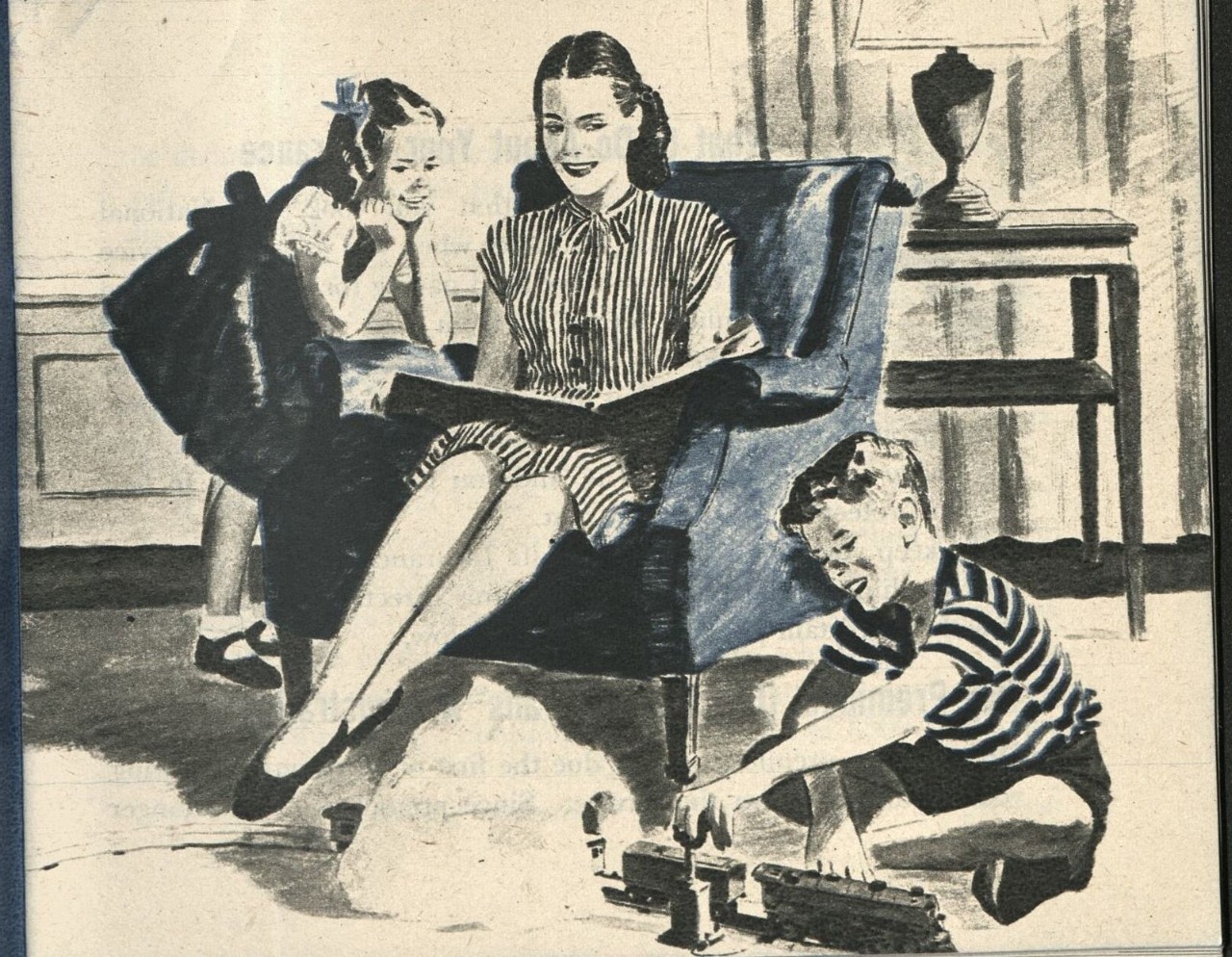

What to do about your Insurance
The chances are that you took out National Service Life Insurance when you joined the service and that you have been paying for it by having the premiums deducted from your monthly pay. If you possibly can, you should keep this insurance inforce when you return to civil life. It is a valuable asset and provides protection for you and your family. If you let it lapse, you may have trouble reinstating it, and you may not be able to buy similar protection for the same cost.
To keep your National Service Life Insurance in force, you must do two things. First, pay the premiums direct. Second, convert it within a certain period, as explained below.
Pay Premiums Direct to Veteran’ Administration
Ordinarily, a premium will be due the first of the month following your separation from the service. Since premiums can no longer be deducted from your pay you must now pay them direct. To be safe, mail a premium by that date in the same amount as that which has been deducted from your pay. Make your check or money order payable to the Treasurer of the United States and mail it to the Collections Subdivision, Veterans’ Administration, Washington 25, D.C. Continue to make this payment regularly the first of each month, whether or not you receive a notice. You are given, for an emergency, a 31 day period beyond the due date in which to make payment.
If you do not want to pay premium monthly, you can arrange to pay quarterly, semiannually, or annually. The method of paying premiums may be changed at any time by notifying the Veterans’ Administration in writing or by paying the correct premium required under the new method of payment you have selected.
If you wish, you can have the amount of your insurance reduced as long as the amount continued is in multiples of $500 and is not less than $1000.
If you are receiving retirement pay, compensation, or pension
25
payments, you can, if you wish, have the premium for your Government life insurance deducted from your monthly payments.

Convert from “Term” to “Life?
As originally issued to you, your insurance was known as 5-Year-Level Premium-Term Insurance. However, under an amendment to the law, this policy, if applied for and made effective on or before 31 December 1945 and not converted, is “good” for 8 years. Policies applied for or made effective after 31 December 1945 are “good” for 5 years. Before the 8-or 5 year term period is up, you must convert or, in order words, changeover to Ordinary Life, 20-Payment Life, or 30-Payment Life if you desire continued coverage.
You can convert the policy while it is in force and at any time after you have had it 1 year, by applying to the Veterans’ Administration. No medical examination is required. Although the premiums to pay on your new policy will be larger than you now pay, it will be worth your while to convert, or your original 5-year term policy has no cash value. When you get your new policy, however, it will be cash value after the first policy year, against which you can borrow if necessary. A word of caution- ordinarily, it will be advisable for you to carry the 5-Year-Level-Premium-Term Insurance for at least a few months after return to civilian life when you will have a more definite idea of the type and amount of permanent insurance you can afford.
Waiver of Premiums (Disability)
If you become totally disabled from illness or injury before reaching 60 years of age, continue to pay your insurance premiums. After 6 months of such continued disability, file a claim with the Veterans’ Administration. If your claim is approved, further premiums will be waived so long as you remain totally disabled, and those you paid during the months of total disability will be refunded to you.
27
Getting Your Insurance Reinstated
If you have let your insurance lapse and wish to reinstate it, it will be necessary to submit an application, plus the necessary premiums (and interest as required) together with evidence to the Veterans’ Administration that you are in satisfactory health. Remember to give the necessary identifying information, such as full name (printed); date and place of birth; grade, rate, or rank: and serial, service, or file number. You can get detailed instructions and forms from the Veterans’ Administration.
Under certain conditions, you may have to pass a physical examination before the insurance can be reinstated. This may be had free of change at Veterans’ Administration offices.
Change of Beneficiaries
You can change your beneficiary or beneficiaries at any time, without their knowledge or consent, by sending a notice in writing, signed by you, to the Director of Insurance, Veterans’ Administration, Washington 25, D.C. (Whenever possible, such notice, should be given on Veterans Administration Insurance Form 336 “Change of Beneficiary- National Service Life Insurance.”) Any beneficiary named must be within the following general classes; wife, husband, child or children, parents, or brothers and sisters of the insured. Changes of beneficiary cannot be made by will.
Private Life Insurance
If you have been paying private life insurance premiums by allotment, arrangements for making premiums payments directly should be made with your private life insurance company as soon as possible.
You may have arranged premiums on your private life insurance guaranteed by the Government when you came into the service. If so, remember that payments must be brought up to date with interest within 2 year after your separation from active service. Your insurance company or the Veterans' Administration will answer any questions
If your private insurance policies had any disability benefit or
29
double indemnity feathers which were discontinued while you were in the service and you wish to place them in effect again, request the private life insurance company which issued your policy to reestablish these features.
In a Nutshell
Don’t let your Government insurance lapse. Pay premiums direct to the Collections Subdivision, Veterans’ Administration, Washington 25, D.C. If it does lapse, get all or some of it reinstated if you possibly can. Be sure to keep the Veterans Administration, Washington 25, D.C., advised of any change of permanent address. If you have any problems, contact the nearest office of the Veterans’ Administration.
A sample copy of the letter which you should use to send your premium payments to the Veterans’ Administration is shown on page 84.
Check on all private life insurance policies.
30
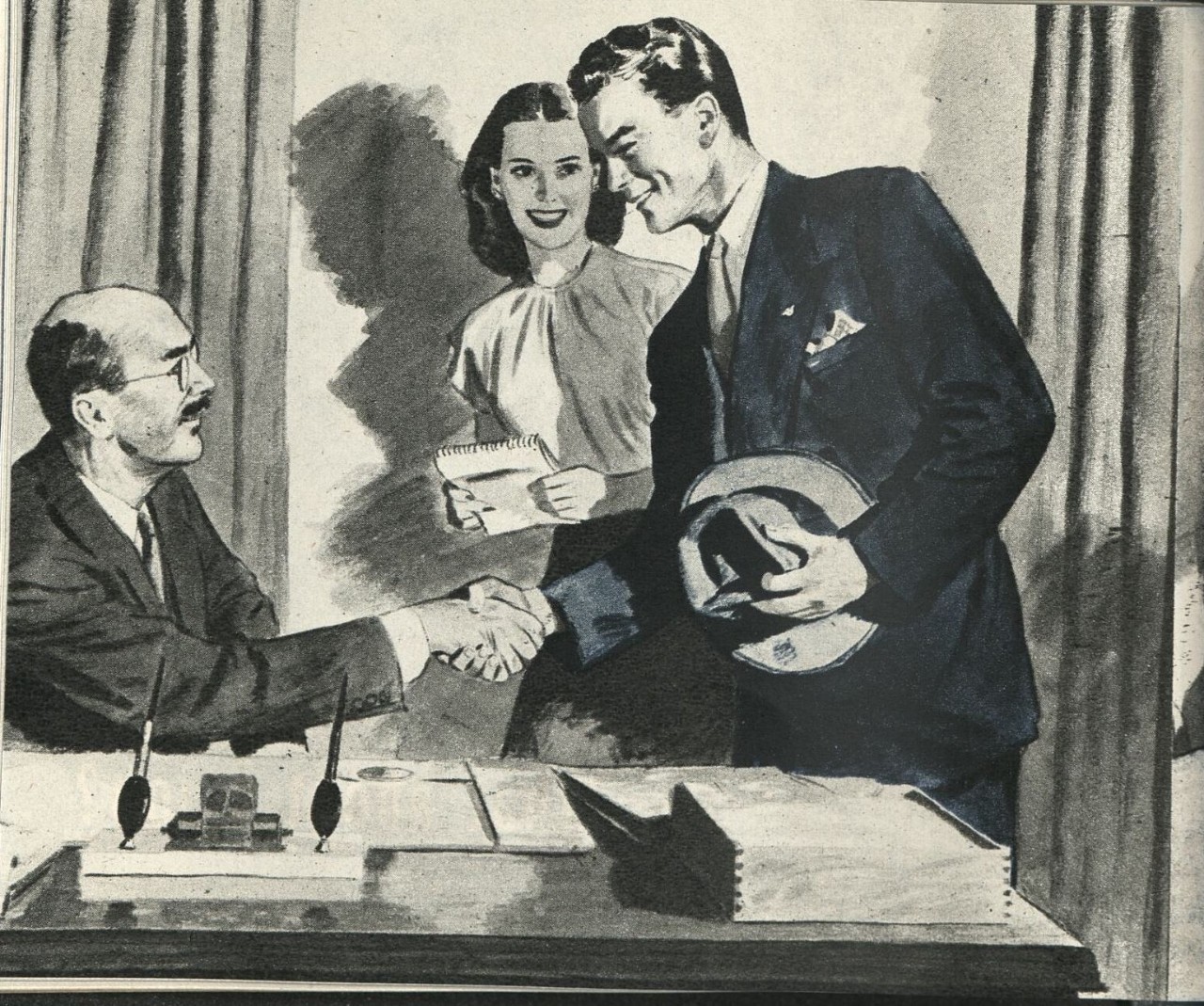

Getting a Job
Your first interest after being separated from active service will probably be to get a job. The Government has made a number of arrangements to help you do this. A form is made up for you to use in finding a job. On it will be important information about you which an employer would like to have. USE IT!
Do You Want your old job back?
The Selective Training and Service Act provides reemployment rights for veterans. To protect these rights, you must make applications for reemployment within 90 days after the date of your separation from active service or your release from hospitalization, if this hospitalization continues after separation from active service and does not extend for more than a year.
33
If you worked for a private employer, call on him as soon as possible, and tell him when you can report for work. In any case, make application for your old job, in writing, to your former employer and keep a copy of your letter. Your employer is required to give you back your old job (or its equivalent) if he possibly can at the same rate of pay and with appropriate seniority and privileges provided you--
1. Are able to perform the duties of the job;
2. Have completed your military or naval service satisfactory (in the Army, this means separation from active service under honorable conditions);
3. Apply within 90 days; and,
4. The job you left was not temporary.
Moreover, the law says that he shall not discharge you without cause within 1 year of your reemployment. If you have difficulty, go to a member of your local draft board who will help you. If necessary, he can obtain the assistance of a United States attorney to present the matter to a Federal District Court. This service is without charge.
If you were a Federal Civil Service employee when you entered the service, you should apply for your old job to the chief of the personnel branch in the agency in which you were employed within 90 days. If you are still qualified, you will get your job back or one of “like seniority, status, and pay.” If the Federal agency for which you worked has been abolished, you should contact the U.S. Civil Service Commission, Washington 25, D.C., or one of its regional offices for information.
If you worked for a State, county, or city when you entered the service, these employers are not required by the Federal laws to provide for the reemployment of veterans. However, most States follow the recommendations of Congress, and many States have passed laws which guarantee you your old job or a job “similar seniority, status, and pay.” See a member of your local draft board as soon as possible for advice in your particular case.
35
Do You Want a New Job?
If so, the United States Employment Service ( U.S.E.S) is ready to assist you. The U.S.E.S. is a Nation-wide organization that helps people get jobs. Its services are free. An important part of the U.S.E.S. is its Veterans' Employment Service and employment counseling service. In each local U.S.E.S office, there is maintained a Veterans’ Employment Representative who gives special attention to the employment of veterans. Get in touch with any one of its local offices when you leave the service. You will be helped in getting a job in your own community or in any place where there may be a need for a person of your abilities.
Do You Want a Government Job?
In seeking a new civil service job, veterans separated under honorable conditions are entitled to special consideration and preference. This applies, in some cases, to the wives of disabled veterans and, provided they have not remarried, to the widows of veterans. There are local civil service secretaries located in all the larger (first- and second-class) post offices, who can advise you concerning Government employment. Also, the nearest United States Employment Service office will obtain full details for you or put you or put you in touch with the proper authorities.
Do You Want Apprentice Training
Almost all of the apprentice-training programs in the United States offer opportunities to returning veterans. You may be employed as an apprentice and be paid as you learn (in some instances, additional payments may be paid under the “G.I.Bill of Rights”), getting not only a steady job, but training, which prepares you for skilled jobs. Age restrictions and other limitations are lifted for you in many cases. Information may be obtained through the nearest United States Employment Service office or the nearest office of the Veterans’ Administration.
37
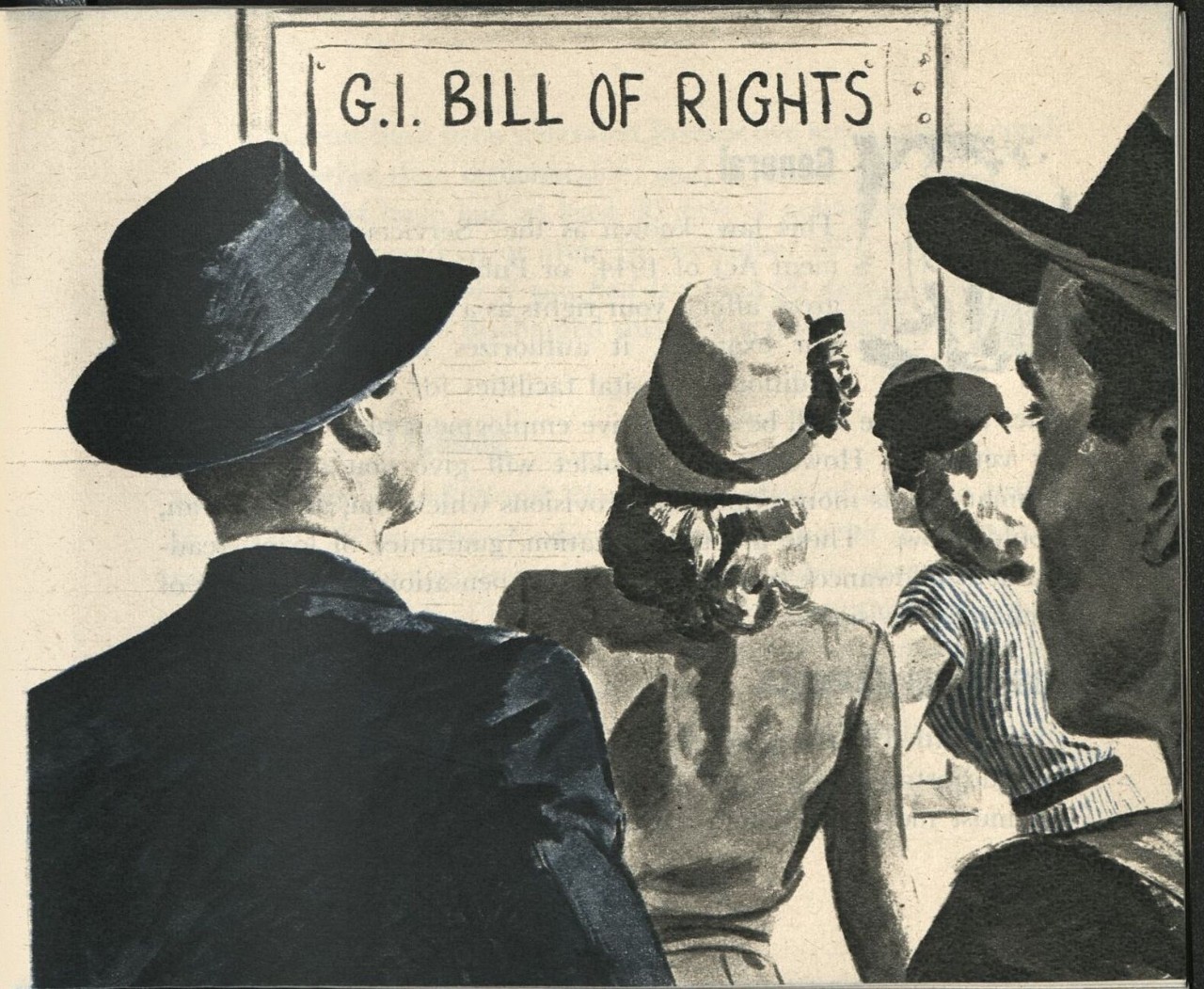

General
This law, known as the “Servicemen’s Readjustment Act of 1944” or Public Law 346, 78th Congress, affects your rights as a veteran in many ways. For example, it authorizes the construction of additional hospital facilities for veterans and provides that's there shall be an effective employment placement service for veterans. However, this booklet will give you only a brief summary of its more important provisions which you, as a veteran, should know. These are the education, guarantee of loans, readjustment allowances (unemployment compensation), and review of discharge provisions.
Basic Requirements
To be entitled to the education or training, guarantee of loans, and the readjustment allowance provisions of the “G.I. Bill of Rights,” you must meet two general requirements. These are--
40
1. You must have been separated from active service under conditions other than dishonorable; and,
2. You must have had at least 90 days of active service, part of which occurred on or after 16 September 1940 and before the end of the war, or if you had less than 90 days of service, you must have been discharged due to a service-incurred injury or disability.
Education or Training
You, as a veteran of World War II, regardless of age, are entitled to at least 12 months of education or training, or a refresher or to at least course (or its equivalent in continuous part-time study) under the “G.I. Bill of Rights,” provided you meet the basic requirements given above and you start such education or training not later than 2 years after your separation from active service or 2 years after the end of the war (whichever date is the later).
Additional Education or Training. After you complete the 12 months of education or training, you entitled to an additional period of education or training equal to the time you have been in active service after 15 September 1940 and before the end of the war, if-
1. You had not passed your 25th birthday when you went into active service (or on 16 September 1940, whichever is later); or,
2. You had passed your 25th birthday when you went into active service (or on 16 September 1940, whichever is later) but can prove to the Veterans’ Administration that your education was impeded, delayed, interrupted, or interfered with because of your entrance into service.
Time spent in active service in the Army Specialized Training Program or the Navy College Training program while enrolled in courses continuing civilian courses and which were pursued to completion or time spent as a cadet or a midshipman in one of the service academies can not be counted toward the 90days of service required or in determining the additional period of education or training to which you may be entitled. No course of education or training can exceed 48 months in length (this may mean as much as 5 ½ ordinary school years of education for you), nor can it extend beyond 7 years after the end of the war.
Choice of School. You may select any course at any educational or training institution which accepts you as qualified, provided the institution is on the Veterans’ Administration’s list. Included on this list are public, private, elementary, secondary, and other schools furnishing education for adults; business schools and colleges; scientific and technical institutions; colleges, vocational schools, junior colleges, teachers’ colleges, normal schools, professional schools, universities, and other educational and training institutions including industrial establishments, providing apprentice or other training on the job.
Tuition and Other Schools Expenses. The Veterans’ Administration will pay to the educational or training institution the customary cost of tuition and such laboratory, library, infirmary, and similar payments as are customarily charged. They may pay for books, supplies, equipment, and such other necessary expenses as are generally required. Such payments cannot exceed $500 for an ordinary school year. If the school fees exceed that amount, you will have to pay the difference. They will not pay for board, lodging, other living expenses, or travel.
43
Subsistence Allowance. The Veterans' Administration will, in most cases, provide a subsistence allowance during the education of training period, of $50 a month if you have no dependents, $75 if you have. (This may be eliminated or reduced, however, if you are working full time, attend on a part-time basis, or receive pay for work done as part of your training.)

Guarantee of Loans for Homes, Farms, and Business
You may be eligible for a partial (in some cases, complete) guarantee of a loan under the law if you can meet the basic requirements and if your application is made within 2 years after your separation from active service or the end of the war (whichever date is the later), but in no event more than 5 years after the end of the war.
Generally, loans can be guaranteed if they are made for the following purposes-
1. Buying residential property; building a home; making repairs, alterations, or improvements in your home; or paying old debts, back taxes, or special assessments on your home.
2. Buying land, buildings, livestock, equipment, machinery, or tools for your use in farming; or making repairs, alterations, or improvements to your farm or farm equipment.
3. Buying a business; or buying land, buildings, supplies, equipment, machinery, or tools for your use in business.
General Requirements. Although the conditions vary somewhat for each type of loan, the general requirements are that-
1. The loan must be used for the purpose specified;
2. The terms of payment can be met from your expected income;
3. The purchase price does not exceed a reasonable normal value;
45
4. The property be useful and reasonably necessary; and,
5. For farms or business loans, that you have the ability and experience to provide a reasonable chance that you will succeed.
Amount of Loan. If you are eligible, the Administrator of Veterans’ Affairs can guarantee up to 50 percent of any loan or loans made to you. In certain cases of second loans made to cover the balance of a loan made by a Federal agency, he may guarantee up to 100 percent of the amount. In neither event can he guarantee more than $2,000. Such loans cannot bear interest of more than 4 percent a year. The Administrator will pay the interest on the guaranteed portion of the loan for the first year. Loans are payable in full in not more than 20 years; in some cases, less than 20 years.
From Whom You May Borrow. If the loan meets the requirements of the law and the regulations of the Veterans Administration, you can borrow from any individual or any firm or corporation. The individual can be any person who will lend you the money. The individual can be any bank, building and loan association, insurance company, or financial institution. However, you should remember that these loans are not made by the Government, nor are they gifts or grants. As a result, you will have to satisfy the lender that you will be able to pay back the loan with interest as it becomes due. Naturally, under such conditions, not all the loans applied for will be approved.
Detailed information concerning guarantee of loans is available at any office of the Veterans’ Administration or at most banks and lending agencies.
Readjustment Allowances (Unemployment Compensation)
Each State and territory has an unemployment compensation program. Unemployment compensation or unemployment insurance provides weekly payments to unemployment workers based on their previous work in jobs covered by such insurance. Most jobs in business and industry such as factories, shops, mines, mills, stores, offices, banks, etc., are covered. Farm work, household service, Government work, and self-employment are not covered jobs. Most States have protected any unemployment compensation rights you may have
47
earned before you went into the service. Therefore, if you were covered, you may be able to draw upon them in case you are unemployed after your separation from the service. The plans of the various states differ in the amounts and duration of the payments. The office of the United States Employment service or State Unemployment Compensation commission nearest your home will be able to give you the necessary information in your particular case.
Under the “G.I.Bill of Right,” provision has been made for “readjustment allowances.” which is another way of saying ‘unemployment compensation.” However, the law states that, when you receive unemployment compensation from a State or from Federal Government, the amount received must be deducted from what you would normally get under the “G.I. Bill of Rights.” You may be eligible for payments under the “G.I. Bill” if-
1. Your former job was not covered;
2. You never held a job before entering the service; or,
3. The amount and duration of the State or Federal payments are less than those authorized under the “G.I. Bill”
Who is Eligible? To be eligible, you must meet the basic requirement and be unemployed within 2 years after your separation from active service or the end of the war (whichever date is the later). In addition, you must be-
1. Residing in the United States when you file your application;
2. Completely unemployed, or if partially unemployed be earning less than $23 per week;
3. Registered with a public employment agency and continue to report regularly to such agency; and,
4. Able to work and be available for suitable work.
Illness or disability which occurs after you have applied for employment to the U.S.E.S office will not disqualify you for readjustment allowances.
Amount and Duration of Payments. Under the law, you may receive 8 weeks of allowances for each month of the first 3 months of active service and 4 weeks of allowances for each additional month’s active service after 15 September 1940 and before the end of the war, up to a total limit of 52 weeks (10 ⅖ months if self-employed).
49
If you are completely unemployed, your allowance is $20 per week. If you are partially unemployed, you receive the difference between your weekly earnings (less $3) and $20 per week. If you are self-employed, you may be eligible to receive the difference between your monthly net earnings and $100.
Who is Not Eligible? You will be disqualified from receiving such allowances if-
1. You leave suitable work voluntarily and without good cause;
2. You are suspended or discharged for misconduct;
3. You fail, without good cause, to apply for suitable work to which you have been referred by a public employment office;
4. You fail to accept suitable work when offered; or,
5. You fail without good cause to attend a free training course.
A job is not considered “suitable” if the wages, hours, or conditions of work are substantially less favorable than those prevailing for similar work in the locality, or if the position offered is vacant because of a strike, lock-out, or labor dispute. Such disqualification begins the week in which the cause of the disqualification occurs and continues for not more than 4 weeks immediately following. Under special circumstances, the Administrator of Veterans’ Affairs may extend the period of your disqualification.
You will also be disqualified from receiving an allowance for any week in which your unemployment is due to a stoppage of work existing because of a labor dispute where you are employed. However, you may still get the unemployment allowance if you can show that you are not directly interested nor taking a part in the dispute.
Review of Discharge
If you feel that your military or naval service justified a more favorable discharge or dismissal than you received, you may at any time within 15 years after your separation from the service request and receive a review of it, unless you were discharged by a general court-martial sentence. Subject to approval by the Secretary of War of the Secretary of the Navy, the reviewing board may-change or modify a discharge or issue a new one, if evidence warrants. Apply to the service in which you served.
51

Rationing
You will need war ration books which can be obtained when you get back home by applying to the War Price and Rationing Board for the place in which you live. Apply in person, with evidence of your separation from active service.
Surplus Government Property
Priority on surplus Government property is given to you for business, professional or agricultural use if you were separated from active service under honorable conditions. There is no priority on surplus property for your own personal use. For further information, you should go or write to the nearest office of the Smaller War Plants Corporation.
Federal Regulations
As long as the emergency lasts, there will be many regulations of the War Production Board, the Office of Price Administration, the War Manpower Commission, the Office of Defense Transportation, the War Food Administration, or other Federal agencies which may affect you. However, in some cases, special exceptions are made for the veteran. Before trying to secure a loan, build a home, start a business, or make any other commitment, you should determine the special restrictions or advantages applying to your case by contacting the nearest office of the appropriate Federal agency. Further information is available through the veterans’ adviser at the nearest office of the Office of Price Administration or nearest War Price and Rationing Board.
Social Security Card
You will need a Social Security Card if you take a job that is covered by unemployment insurance. Most jobs in private business and industry are covered. If you had a card before entering the service, locate it now so you will have it ready to show your employer. If you had a card but cannot find it, apply for a duplicate at the nearest Social Security Board office.
55
School or College Credit
You may wish to apply for school or college credit for courses you took, service schools you held while in the armed forces. Write directly to the school or college you want to attend. In close with your letter a certified copy of one of the following forms, depending upon the service in which you served-
Army- W.D., A.G.O. Form 100, Separation Qualification Record.
Navy- Notice of separation from the U.S Naval Service, Nav Pers 553.
Marine Corps-U.S Marine Corps Report of Separation NAVMC 78-PD.
Coast Guard- Notice of Separation from the US Naval Service-Coast Guard, Nav CG 553.
If You Become Disabled
If your disability is due to service, read “What the Disabled Veteran Should Know”. If your disability is not due to active service and it is a permanent and total disability, you may be entitled to a pension. This is known as a non-service-connected pension. In order to be entitled to this type of pension-
1. You must have been separated from active service under conditions other than dishonorable; and,
2. You must have had 90 days or more of active service, part of which occurred on or after 7 December 1942 and before the end of the war, or if you have less than 90 days of service, you must have been separated from active service for a disability incurred in service.
The amount of this pension is $50 monthly; when you have received a pension for 10 years or reach the age of 65, the amount is increased to $60. No such pension can be paid when you do not have a wife or minor child and your income exceeds $1,000 a year. Similarly, no pension can be paid when you have a wife or minor child and your income exceeds $2,500. Applications for such pensions are properly made to any office of the Veterans’ Administration.
57
Veterans with vocational handicaps not due to active service should apply to their state Board of Education for training and assistance.
Hospital Treatment and Veterans’ Administration Homes
If you are separated from the service under conditions other than dishonorable and your illness is not due to service, hospital treatment and care in a Veterans’ Administration Home are provided by the Veterans’ Administration if you are not able to pay. You will be required to file an application setting out the facts, and your sworn statement that you cannot pay for the care will be accepted as sufficient evidence by the Veterans’ Administration.
State Benefits
Most states have passed laws granting rights, benefits, or privileges to veterans. These are in addition to those provided by the Federal Government. The benefits range all the way from bonus, educational aid, vocational training, employment preferences, and guarantee of loans to official recording of separation records, exemptions from taxes and license fees, assistance in securing benefits, preservation of unemployment benefits, medals, and legal aid, depending upon the individual State. Most States have a service officer of veterans’ commission located at the State capital to help you in determining the State benefits to which you may be entitled. Such information will also be available at your Veterans’ Information Center.
When Writing
In correspondence with the service in which you served or with the Veterans’ Administration or other organizations, your full name; date and place of birth; grade, rate, or rank; and serial, service, or file number should be given as well as any other information that will be helpful, such as the number of your insurance policy if the correspondence concerns insurance. This will result in faster action for all concerned.
59
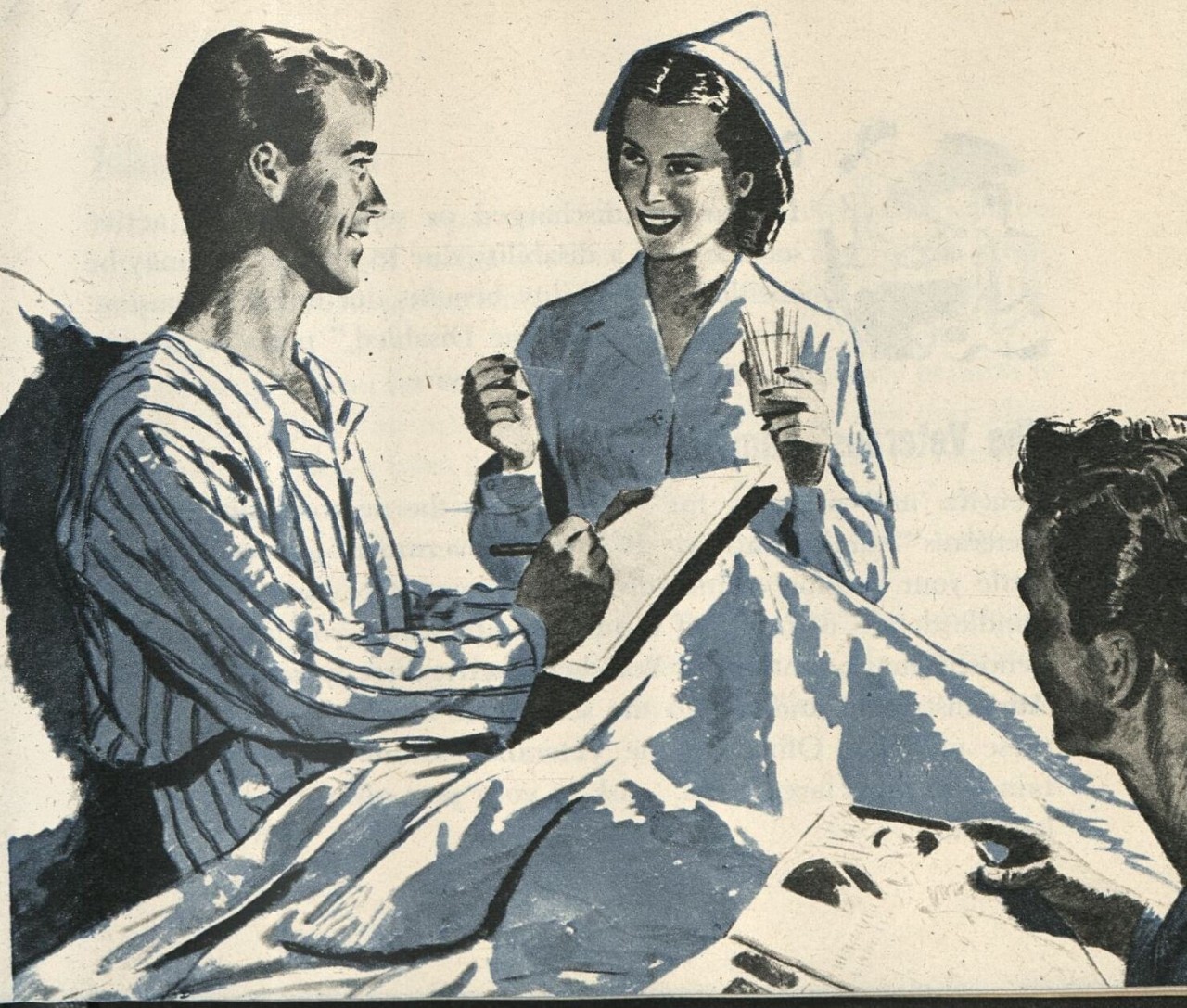
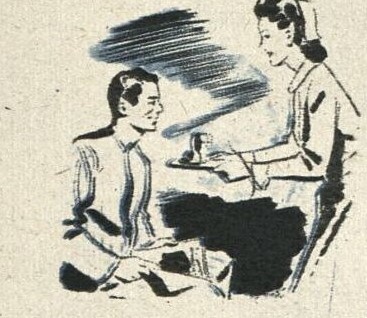
General
If you are discharged or separated from active service with a disability due to service, you may be entitled to disability benefits, including a pension. (See “If you Become Disabled,” page 56, if your disability is not due to service.)
The Veterans Administration
Benefits and pensions for veterans are the responsibility of the Veteran’ Administration. It is this Government agency that will settle your pension claims, decide the amount of the pension, and handle details of many of the benefits to which you and your dependents may be entitled. You should write directly to the Veterans’ Administration and not to the service in which you served about these matters. Offices of the Veterans Administration are maintained in most large cities. Ask at your post office for the nearest location.
Filling Your Claim
When you are being separated from active service, you will be advised of your right to file a claim for pension and, if you wish, help in making applications for this benefit before you leave the service.
The proper form for making application for disability pension is V.A. 526. You can make a claim on the form at any time after discharge or release from active duty. Copies of it can be obtained at any military or naval installation, office of the Veterans’ Administration, or Red Cross chapter. You can get whatever help you need in filling out the form at any of these places.
Even though you sign a statement at the time of your separation from the service saying that you do not desire to file an application for pension, this will not prevent you from filing a claim at any later date.
63

Handling Your Claim
If you need advice or aid in connection with the handling of your claim for a pension or other disability benefit, you may obtain such assistance without charge from the nearest office of Veterans’ Administration, your local Red Cross chapter, or any of the organizations recognized by the Veterans’ Administration.
If you wish, you can get help and advice of legal counsel. Ordinarily, such assistance will not be necessary. However, if you do employ a lawyer, remember that fees for legal services in connection with pension claims are limited by law.
Your “C” Number
The first filed by a veteran is assigned a claim number. This is commonly referred to as a “C” number. It never changes. All later claims will come under this “C” number regardless of when the disability raised. The Veterans’ Administration thus keeps a continuous record in one file. Further claims should never be submitted as if they were original applications. Always identify any claim by using the first “C” number assigned to you. To save time and trouble in handing your papers, keep a record of your “C” number just as you do your serial, service, or file number.
Power of Attorney
If you want, you may appoint an authorized representative of one of the organizations recognized by the Veterans’ Administration to prepare, present, or appeal your pension claim. Upon your request at the Separation Center or hospital, you will be given a list of recognized organizations and will be assisted in preparing the necessary power of attorney.
Veterans’ Administration Makes Final Decision not the Services
Your medical board makes a report on your disability, but the final decision as to whether or not you get a pension rests with the Veterans’ Administration. If you disagree with the medical board and believe
65
that you are entitled to disability benefits, you have the privilege of filling a claim directly with the Veterans’ Administration. Make application when you believe that your claim is fair and proper.
Pensions Based on Degree of Disability
Pensions are based upon the percentage of disability and run from 10 percent to 100 percent in multiples of 10. For instance, a veteran with a 10 percent disability receives $11.50 monthly, which is 10 percent of the total disability award of $115. In addition, there are special rates and allowances for specific injuries and more seriously disability conditions. No additional disability pension is payable for dependents.
Pensions Are Safeguard
Pension payments to you or to your beneficiaries are not assignable and are exempt from taxation (including income tax), attachment, levy, or seizure, either before or after you get them. These provisions do not apply to property purchased with these payments.
66
Free Training
You may be trained to return to your job in spite of your disability. If your disability prevents you from working at your old job, you can be taught a new occupation in which your disability will not hinder you. Such teaching is called vocational training, and it is enabling many veterans to overcome physical handicaps, to adjust themselves to civil life, and to regain their earning power.
Expenses for tuition, book, supplies, and equipment are paid by the Government. During training, if the pension being received is less than $92 per month, it will be increased to the rate of $92 per month if you are single; $103.50, if married. There is an added allowance of $5.75 a month for each child and $11.50 for each dependent parent.
Insurance
Provisions for waiver of insurance premiums for totally disabled veterans is discussed under the title “Waiver of Premiums”
67
Hospital Treatment, Medical Service, Veterans’ Administration Homes, etc.
If you should ever need further hospital care for a service-connected disability, it will be provided upon request to the Veterans’ Administration. You will be given proper hospitalization and free transportation (when authorized by the Veterans’ Administration) to the appropriate hospital. Your own ability to pay has no bearing on this service.
Medical service or dental care not requiring hospitalization, will also be provided. This service includes medicine, appliances, bridge, work, etc. Of course, the condition must have been caused or aggravated by your military service.
If you are so disabled as to be unable to earn a living and are without adequate means of support, you can apply to the Veterans’ Administration Homes located throughout the country.
68
Review of Retirement
If you are an officer or former officer who has been retired or released to inactive service without pay pursuant to the decision of a retiring board because of physical disability, you have the right (within 15 years) to request review of the retiring board’s decision. Application should be made to the service in which you served.
Emergency Financial Assistance
If you should need emergency financial assistance between the time you are separated from the service and the time your claim is decided by the by the Veteran’s Administration, you may be able to get it through your local chapter of the Red Cross. Assistance may be by grant or by loan, depending upon your apparent ability to repay. It is made for such needs a shelter, food, clothing, and fuel. Application for such assistance should be made to the local chapter of Red Cross. Help is securing benefits to which you or your family may be entitled is also provided.
69
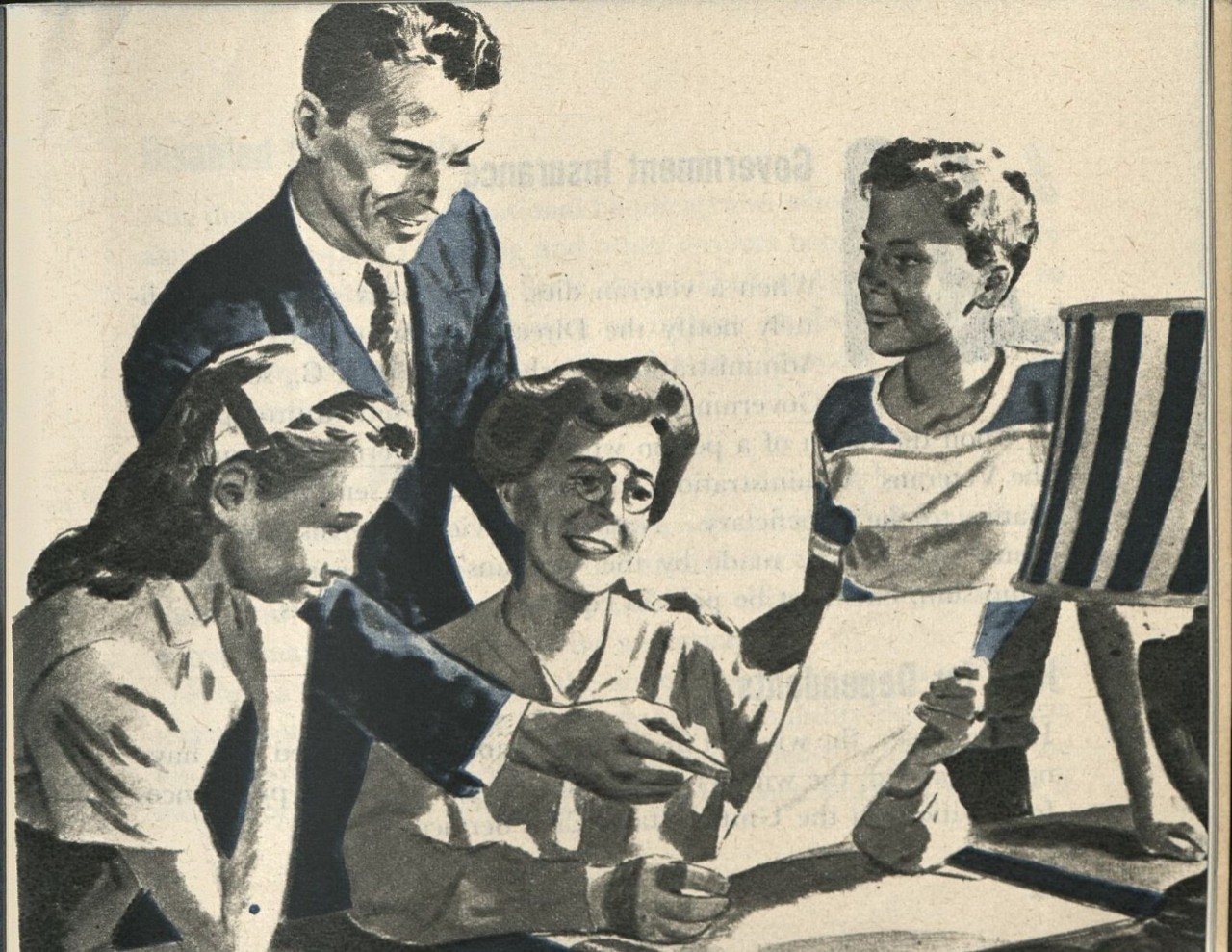

Government Insurance
When a veteran dies, dependents should immediately notify the Director of Insurance, Veterans’ Administration, Washington 25, D.C., so that his Government insurance can be settled promptly.
Upon the death of a person who carried Government insurance, the Veteran’s Administration, when notified, will send the necessary blanks to the beneficiary. National Service Life Insurance payments may not be made by the Veterans’ Administration in one lump sum, but must be paid in equal monthly payments.
Jobs for Dependents
In some cases, the wives of disabled veterans and, provided they have not remarried, the widows of veterans are given certain preferences for position in the United States Civil Service.
72
Disabled Dependents
Any dependent with a vocational handicap and who is of employable age may get special training and other services necessary to prepared him for a job through the State Rehabilitation Agency. Apply to your State Board of Education, or inquire at the nearest United States Employment Service office for the location of the State Rehabilitation Agency.
Pensions for Dependents
A veterans’ own pension for disability is not continued after his death.
When a former member of the armed forces dies of a service connected disability, his widow, child or children, and dependent parents may be entitled to receive a pension.
When a former member of the armed forces dies not as a result of service but at the time of his death had a disability due to service, his widow and child or children may be entitled to a pension if the income of the widow (or child) does not exceed $1,000 a year, or if the income of a widow with a child or children does not exceed $2,500 a year. Parents are not entitled to pensions when the veteran’s death is not the result of service.
All applications for pensions should be filed with the nearest office of the Veterans’ Administration.
Social Security Benefits
In the event of the death of a former member of the armed forces who was employed in private business or industry, survivor’s insurance benefits may be payable on his social security account. The next of kin should inquire at the nearest Social security Board office.
Burial Benefits
Any veteran whose last active service terminated honorably (and the veterans’ wife and certain members of his family) may be buried in any national cemetery. Requests for burial should be directed to the Superintendent of the national cemetery chosen.
74
An American flag may be secured by the next of kin for draping the casket of a deceased veteran separated from the service under conditions other than dishonorable, through the nearest office of the Veterans’ Administration or the country seat postmaster.
Headstones are supplied without charge for the unmarked graves of veterans separated from any of the armed services under honorable conditions upon application to the Memorial Division, Quartermaster General, U.S. Army, Washington 25, D.C.
Dependents of deceased veterans separated from the service under conditions other than dishonorable, may file claim for burial expenses not to exceed $100 with the Veterans’ Administration within 2 years from the date of the veteran’s burial.
Special Assistance
Assistance is provided to the dependents of deceased veterans in securing any benefits to which they may be entitled by most of the organizations which assist to veteran.
75
| For Further Details as to | Apply to: |
| General Information | Veterans Information Center Red Cross Army Personal Affairs Officers Navy and Coast Guard Civil Readjustment Officers Marine Corps Rehabilitation Officer |
| Legal Assistance | Before Discharge-Legal Assistance Officer After Discharge Your Lawyer, Bar Association (City, County, or State), Legal Aid Society |
| Emergency Financial Assistance | Red Cross |
| Registration and Reclassification | Your Local Selective Service (Draft) Board |
| Insurance | Government Insurance- Veterans’ Administration Commercial Insurance- Your Insurance Company |
| Employment | Old Job- Your Local Selective Board New Job- United States Employment Service Government Job- U.S. Civil Service Commission |
| Vocational Training | When Disability Due to Service- Veterans AdministrationWhen Disability not Due to Service- Department of Education in Your State |
| Education | Veteran’s Administration School or College Which You Wish to Attend Department of Education in Your State |
| Guarantee of Loans | Veterans’ Administration Agency from Which You Intend to Borrow |
| Readjustment Allowances | United States Employment Service State Unemployment Service Compensation Commission |
| Pensions, Hospitalization Medical, Care, and Veterans Homes | Veterans’ Administration |
77
Personal Record
Name
Highest Grade, Rate, or Rank
Serial, Service, or File Number
Dates of Promotion
Social Security Number
Entry into Service:
Place
Date
Branch
Commission:
Date of Appointment
Reported for Duty
78
Separation
Place
Date of Separation from Active Service
Date of Retirement
Military Assignments:
Organization
Place Date
Commanding Officer
Organization
Place Date
Commanding Officer
Organization
Place Date
Commanding Officer
79
Service Schools Attended:
Date Place
Date Place
Date Place
Battles and Campaigns:
Decorations, Citations, etc.:
Service Wounds:
80
Selective Service Information:
Local Board Number
Local Board Address
Induction Order Number
Date or Report after Separation
National Life Insurance:
Number of Policy
Date of Policy
Amount of Policy
Date Premium Due
Amount of Monthly Premium
Policy must be Converted Before
Pension:
Date of Claim
“C” Number of Claim
81
Other Addresses:
Veterans Administration
Veterans’ Information Center
Red Cross
United States Employment Service Office
State Service Officer
Bar Association (city, country, or State)
Legal Aid Society
My Own Lawyer
My Own Doctor
83
Letter Referred to on Pages 25 and 30
Collection Subdivision,
Veterans Administration
Washington 25, D.C.
Gentleman:
Inclosed is remittance in the amount of $ in payment of the premium due
On National Service Life Insurance on the life of
Please send future communications and premium notices to the insured at the following address:
84
In an Emergency
Notify
My records can be found
My will can be found
85
Distribution:
A copy will be distribution to every individual separated from active service in the Armed Forces.
ARMY: Same as W.D. circulars,
NAVY: Personnel Separation Points
MARINE CORPS: Separation Points
COAST GUARD: Authorized Separation Points.
86
